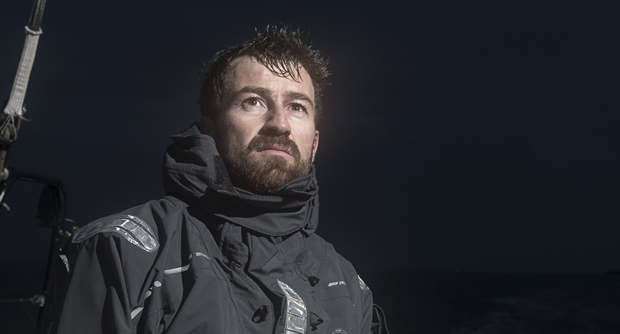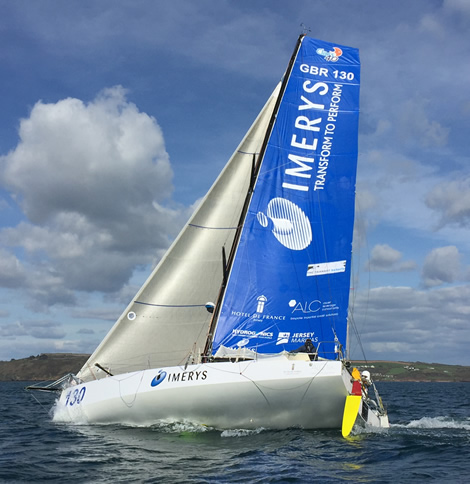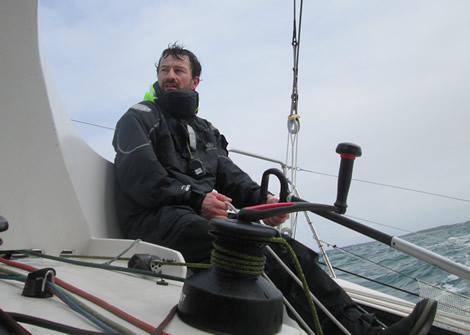British hope
Britain's competitive hopes in The Transat bakerly rest squarely on the shoulders of Phil Sharp and his entry Imerys in the ten boat Class40 fleet. An 11th hour entry, Sharp has a competitive boat in the Mach40 that as GDF Suez was the top boat of 2013-4 in the hands of Seb Rogues.
Jersey-based Sharp’s participation in The Transat bakerly came about for less than positive reasons. He had his hopes set on an IMOCA 60 campaign for this autumn's Vendée Globe. He had a benefactor in place willing to purchase a boat for him, however “the problem was getting a boat in time, because there simply weren’t any half decent boats available,” recounts Sharp. “Basically the timing got later and later trying to purchase one. We were hoping to get hold of the Farr (ex BT/Hugo Boss) but a Japanese team came in to buy it and it got way too risky for us.”
The purchaser of the boat which Alex Thomson sailed to third place in the last Vendée Globe is former Velux 5 Oceans competitor, Kojiro Shiraishi. However with the maximum number of available berths in the solo non-stop around the world race standing at 27, there remains some debate as to how those skippers still on the waiting list for the race will be allowed in, ie will it be the first next skipper on the list, or will there be a Notice of Race amendent so that it is the next Japanese one?!
Thanks to the big demand (33 skippers gunning for 27 berths) and a lack of available boats, the market for IMOCA 60s has shot their price through roof in the last months.
Sharp continues: “Having built up relationships with potential partners, we decided it would be sensible to default to a Class40 project. We could have a competitive entry in the Class40 championship for the year which would provide a good platform to introduce new partners to ocean racing leading into an ideal window to get a boat after the next Vendee Globe. It also coincided with this competitive Mach40 coming on the market.”
Following her successful career with Seb Rogues, the boat was sold to a Brazilian owner who raced it in the Transat Jacques Vabre last year.
The Mach 40 is a far cry from the Pogo 40 Sharp sailed a decade ago. The latter was part cruiser, a production boat. The Sam Manuard-designed Mach 40 is an uncompromised, full bore racing weapon.
“These new boats are so aggressive,” confirms Sharp. “They are completely different to the boats 10 years ago. This properly slams and is very loud down below. It is stiff, it is built for racing, it is a thoroughbred Class40. I am happy to own a Manuard design, because they come after a hell of a lot of development and from a very talented sailor as well, who's had a lot of input from his Minis. From that experience, this 40 is very good, a well-balanced boat.”
Imerys has come on board as title sponsor, a French international company who’s core business is the production and processing of industrial minerals.
“They are diverse, but very innovative,” Sharp explains. “They make a lot of roofing in France and are involved with the technology that goes into lithium batteries. There are some strong synergies with what we are doing with the development of our green technologies, to try and decarbonise the boating sector through zero emission energy systems - something we’ve working on with various institutes and specialists for the last couple of years. We’ve got to the stage where we want to put this into a boat and finish developing and testing it. Imerys can help us developing the batteries for that, to give us a performance advantage and also to give us that independence on the ocean where we can absorb renewable energy and avoid any reliance on the shore.”
The energy aspect of Sharp’s campaign is where he is wisely hanging his hat commercially, but is also a personal passion having sailed the Mini Transat in 2005 with solar panels as his only form of power generation.
“For the 60 project we looked at the possibility of reducing the weight of the diesel system by using a fuel cell and a hydrogen storage unit and those studies came out very positive.” Sharp says he wants to test elements of the system (at least those permitted by class rules) on the Class40 before putting the complete systems together on an IMOCA 60, which he would like to have on the start line of the next Barcelona World Race in 2018.
Obviously a fossil-fuel free IMOCA 60 is not a new concept. Spain’s Javier Sanso tried this on his Owen-Clark designed Acciona in the last race and we believe Parlier before him. However Sharp points out that this wasn’t as heavily optimised as he hopes to achieve and didn’t rely on hydrogen technology, but had it as a back-up. “Ours is a much more hybridised system and we are hopefully going to have a system that is very adaptable for a wide variety of boats to help decarbonise the sector.”
Of the available wind, water and solar generators available, while most of the solo offshore fleets favour the Watt & Sea hydrogenerator (despite the reliability issues units faced in the last Vendée Globe, and not helped by the company’s factory in La Rochelle burning down this February), Sharp is backing solar.
“That is getting more efficient and lighter, to take advantage of the area of the deck and the sails, which is a future step in sailing, incorporating solar into the structure. They are doing that in roofing now - thin film cells are being laminated into roofing structures. In the future, when it is much cheaper, we’ll be able to put a [solar panel] film over our sails and not worry about changing sails or the technology being too expensive.”
Back to the more immediate task and today Sharp sets off into a grey Atlantic as one of just two British competitors in The Transat bakerly. While Sharp famously won the Class40 division of the Transat’s French equivalent, the Route du Rhum, in 2006, he’s never sailed the Transat. “It has always been a race that I’ve wanted to do,” he says.
In reality, this event is perfect for Sharp who in another life would be a paratrooper or SAS, having hardness to an almost Pete Goss degree (let it not be forgotten that Goss competed in this race in 1988 aboard a 26ft Firebird catamaran, better suited to day sailing).
“There are going to be no comforts at all on a race like this,” Sharp continues. “We are going to get a pummelling. It is just the whole extreme nature and the adventure of a race like this that attracts me. We’ll get between three and six lows and you are going against the systems, so everything comes at you very quickly which means the transitions are will be very important. So it will be about being one step ahead, looking two systems ahead and making sure you are prepared.”
In the ten boat Class40 fleet, only Louis Duc on Carec has done the race previously, finishing fourth in 2008.
“People don’t realise that this is a million miles away from the trade wind sailing of the Transat Jacques Vabre/Route du Rhum, where you are wearing shorts and T-shirts. This is a serious race! You expect mentally you might get a system at the beginning and the rest will be plain sailing, but this is going to give you a hard time potentially all the way to New York. And it gets quite extreme close to the Grand Banks because the temperature plummets and you’ve got the Labrador Current coming down and there’s potentially a lot of fishing trawlers to avoid.
“If you look at the stats for the race, there is a huge amount of upwind and you are likely to pass through at least one major system, so preparation is everything. It will be a race of seaworthiness as well, so you have to make sure you keep all your gear in one piece all the way to the end and make sure you have your storm sails ready to go and that you’re happy to use them and that you can keep pushing the boat in all these conditions, hard with the right sails up and a good pilot set-up.”
So is he good at that? “I’ll have to learn! I don’t know yet!”
Sharp is doing the Class40 circuit this year. Following The Transat bakerly this comprises the Atlantic Cup up the east coast of the US from Charleston, SC to New York and then on to Portland, Maine before the boats head up the St Lawrence River for the start of the fully crewed Quebec-St Malo Race eastbound back across the North Atlantic.
So, in theory he moves into the IMOCA 60 next year, buying a boat at what should be the ‘bottom’ of the market, straight after the end of the Vendee Globe next spring. “It is five year plan culminating in the Vendee Globe 2020 and with ideally a full IMOCA Ocean Masters Championship,” Sharp concludes.














Latest Comments
Add a comment - Members log in